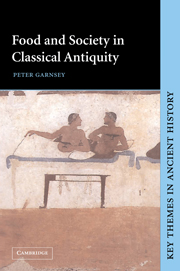Book contents
- Frontmatter
- Contents
- List of illustrations
- Acknowledgements
- Abbreviations
- Preface
- Introduction: Food, substance and symbol
- 1 Diet
- 2 Food and the economy
- 3 Food crisis
- 4 Malnutrition
- 5 Otherness
- 6 Forbidden foods
- 7 Food and the family
- 8 Haves and havenots
- 9 You are with whom you eat
- Conclusion: Choice and necessity
- Bibliographical essay
- Bibliography
- Index
2 - Food and the economy
Published online by Cambridge University Press: 05 June 2012
- Frontmatter
- Contents
- List of illustrations
- Acknowledgements
- Abbreviations
- Preface
- Introduction: Food, substance and symbol
- 1 Diet
- 2 Food and the economy
- 3 Food crisis
- 4 Malnutrition
- 5 Otherness
- 6 Forbidden foods
- 7 Food and the family
- 8 Haves and havenots
- 9 You are with whom you eat
- Conclusion: Choice and necessity
- Bibliographical essay
- Bibliography
- Index
Summary
PRELIMINARIES
People can consume only such food as is available. Availability is determined by the physical environment and the economic, social and political structures. It is not a straightforward matter to separate out the economic factor. By one influential view associated especially with Moses Finley, the economy of early or simple societies was embedded in society and politics. Economic relations were an extension of social and political relations; they were governed by the value system of homo politicus rather than homo economicus. The dependence of the economy on the polis or state structures is symbolised in a lacuna in the works of Aristotle. Aristotle was a prolific writer, but he did not write a book about economics. If he had composed a book with the title Oikonomia (or following Xenophon, Oikonomikos), it would have been about household management, for that is what oikonomia means. In the absence of ‘an enormous conglomeration of interdependent markets’ and the spirit of economic rationality that such a market system engenders, ancient thinkers simply had not conceptualised the economy.
The problems involved in disentangling economics from politics are exemplified in the area of distribution and trade. The essence of trade is market exchange. One can easily misclassify as trade a lot of commodity movement and transference which is politically directed and controlled, and does not involve exchange in the market. Yet market exchange did exist in antiquity, even if it was less important than it is today, and the distribution of surplus food does have an economic dimension. It can certainly be legitimately talked about, alongside the production and processing of food, in a discussion of the economic aspects of food.
- Type
- Chapter
- Information
- Food and Society in Classical Antiquity , pp. 22 - 33Publisher: Cambridge University PressPrint publication year: 1999
- 1
- Cited by

